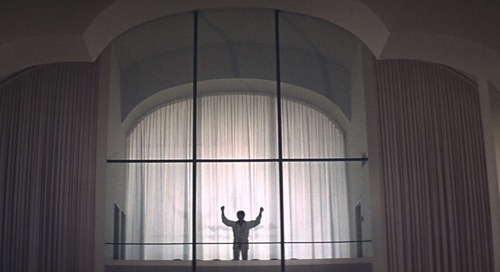Here it is, my last column on classic films. To commemorate the end of another wonderful semester and those graduating, we turn to number 17, The Graduate.
The movie begins the summer after Benjamin Braddock (Dustin Hoffman) graduates from college. He doesn’t know what he wants to do with his life, and his father (William Daniels) and his parents’ friends seem keen on making that decision for him, which becomes clear from the graduation party they throw him. Apparently plastics was a hot field in 1967. Benjamin is asked to drive the wife of his father’s law partner, Mrs. Robinson (Anne Bancroft), home where she tries to seduce him. He’s hesitant at first, but through the unwitting advice of Mr. Robinson who counsels Benjamin to enjoy his youth while he can, he goes ahead with the affair.

With the pressure to make major life decisions mounting, Benjamin’s father forces him to take Elaine, Mrs. Robinson’s daughter, out on a date to see if they might be interested in getting married. Mrs. Robinson warned Benjamin that as long as they were involved, her daughter was off limits, so Benjamin tries to make himself as unappealing as possible, hurts Elaine’s feelings, and winds up kissing her to make up for it. In his embarrassment and newfound connection with Elaine, he reveals the affair he had with her mother. In shock, Elaine takes off to Berkeley and cuts ties, so that when Benjamin comes to find her, she’s been made to think he raped her mother. Benjamin also finds out she’s betrothed to another man. Mr. Robinson finds Benjamin and threatens him to stay away from his family. Benjamin seems intent on doing just that, but in a last ditch effort to enjoy his youth as he was so prophetically advised, he drives to Santa Barbara where Elaine’s wedding is taking place, runs into the church a hair too late, and disrupts the whole affair with his Stanley Kowalski-esque bellows of “Elaine! Elaine!” His presence causes an all out fist fight, but he and Elaine escape, hail down a bus, and travel down a long and dusty road, no more sure of their future than they were months before.

As is typical of college graduates, most of the learning about life is done post-academia. Whatever Braddock learned in school (although he is not yet 21 when he graduates, a potential plot hole), it could never have prepared him to face the temptations of, well, a cougar, the pressure from his family to get a job or get a life, the ability to upend someone else’s life completely with one impulsive decision, or the pull of individuality and living according to one’s own standards over following the herd. These were all lessons Benjamin had to learn on his own through cold, hard experience.

Some may find it amusing that the father figure in this movie is none other than William Daniels—Mr. Feeny from Boy Meets World, the esteemed and wise educator. I’m not sure his philosophical powers were in as fine a form in his character in the movie, but it’s interesting to note nonetheless. When I first watched this movie, I watched it because of its fame and because of the illustrious soundtrack that brought Simon and Garfunkel to the forefront of the music industry. Their music makes this film as much as the themes and technical construction do. But I wasn’t all that intrigued with the plot. I found it slow, boring, and anticlimactic. I felt frustrated by the pace of the movie, and in my view what were failed expectations for a movie of such caliber and hype. It wasn’t until later when I was able to analyze the film that I realized the sense of frustration, that slow-going what-the-hell-is-happening feeling was intentional. Through the films construction, the audience is able to feel the palpable sensation of placelessness and confusion that Benjamin feels throughout the film. It isn’t until the pivotal scene when Braddock’s car runs out of gas just before he makes it to church and when he is banging on the glass in the church, that the viewer finally feels a sense of validation and excitement, which is the same trajectory Benjamin’s feelings followed.
Of course, Dustin Hoffman strikes again in his earlier work, his awkward personality and unique vocal quality lending themselves perfectly to the characterization of Braddock. It is pretty much a one man show in the acting department, and the cinematic construction, while not revolutionary, certainly had its film noir moments reminiscent of Double Indemnity and Casablanca in the way shadows played up the drama, particularly where Mrs. Robinson was involved. In short, the movie is worth its hype, even if it may not seem like it upon first viewing. Good for a nostalgic look back at those days following college graduation, or for a Hollywood take on the experience that will resonate with college grads everywhere.

To everyone who followed or enjoyed even one of my columns, I hope you learned a little bit about what makes great films, and maybe added a couple of gems to your viewing repertoire. I haven’t been able to cover all of the films on the American Film Institute’s list, but there’s nothing stopping you from embarking on the same challenge I have. Happy watching!










